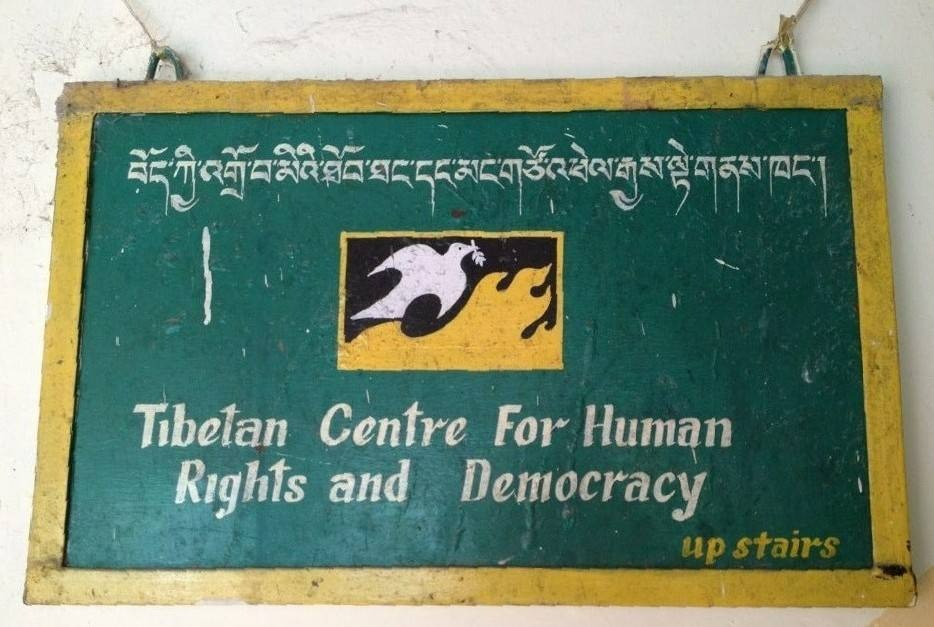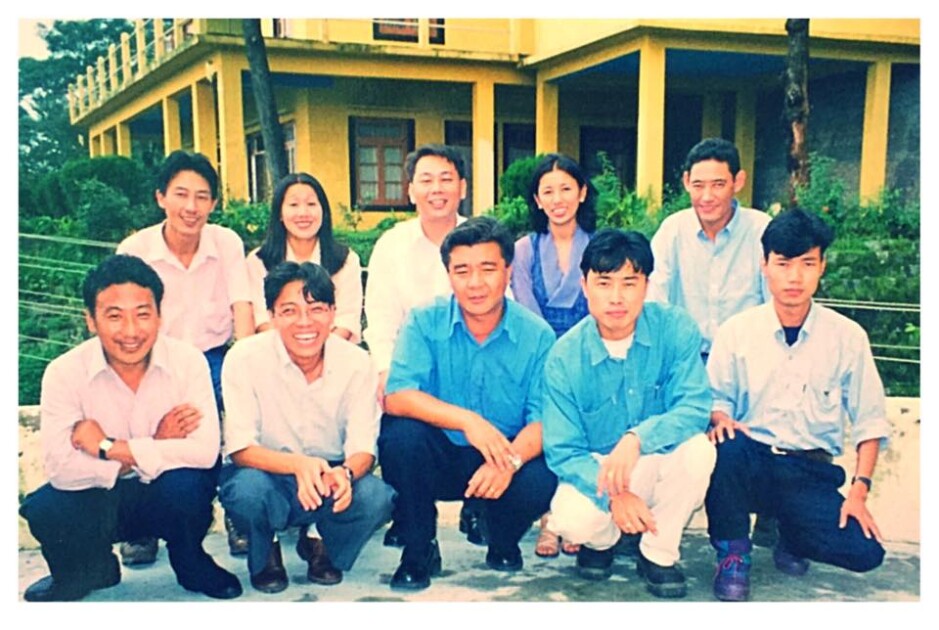About TCHRD

Mission
The Tibetan Centre for Human Rights and Democracy (TCHRD) is committed to advancing human rights and democracy in Tibet and the exiled Tibetan community by empowering Tibetan advocates and monitoring, documenting, and campaigning against human rights abuses.
Vision
We envision a future where every Tibetan can exercise human rights and democratic freedoms.
Values
Equality, non-violence, justice, dignity, empowerment, and courage.
Our History

TCHRD is the first Tibetan non-governmental human rights organization established in exile. Founded in January 1996, it is based in Dharamshala in the northern Indian state of Himachal Pradesh and registered as an NGO under Section 2 of the Indian Societies Registration Act, 1860.
Mr. Lobsang Nyandak is the first executive director. He was succeeded by Ms. Tsewang Lhadon, followed by Mr. Urgyen Tenzin, Ms. Tsering Tsomo and by the current executive director Ms. Tenzin Dawa in June 2023.
All permanent staff of TCHRD are Tibetans living in exile with the understanding, experience and skills necessary to provide accurate, up-to-date insights into life in occupied Tibet.
TCHRD logo features the image of a white dove rising out of flames. The dove and olive branch are the universal emblems of peace. The flames, drawn in traditional Tibetan style, represents the suffering of Tibetan people, as well as the devastating and unifying force of truth.
TCHRD is currently a member of the Geneva-based World Organisation Against Torture (OMCT), Asia Pacific Refugee Rights Network, and International Fellowship for Reconciliation (IFOR). TCHRD is also a partner of the Armed Conflict Location & Event Data Project (ACLED).
TCHRD has collaborated with many leading human rights organizations, individuals, groups, and universities across the world.
Board of Directors
Rinchen Khando Choegyal was born in Kandze, eastern Tibet, and escaped to exile in 1959. Mrs. Choegyal received her B.A. degree at Loreto College in Darjeeling, India. She is a founding member of the Tibetan Women’s Association and served as its President from 1984 until her nomination to the Tibetan Cabinet in 1994. She is the Director of the Tibetan Nuns Project (founded under the Tibetan Women’s Association), which facilitates education and builds nunneries for nuns escaping Tibet. She has also served as the Minister of Education in the Central Tibetan Administration, a post in which she was responsible for overseeing the education of all Tibetan children living in exile in India and Nepal. She is married to the younger brother of His Holiness the Dalai Lama, Tenzin Choegyal, and is the mother of two children.
Mr. Thupten Lungrig was born in Amdo Rebkong, Tibet, in 1957. He attended CST Dalhousie. He obtained his Masters or ‘Acharya’ Degree from the Central Institute of Higher Tibetan Studies (CIHTS), Varanasi, India in 1981.
He has served the Tibetan Children’s Village (TCV) for 15 years in various capacities as a teacher at TCV Dharamshala from 1981-1992, as a Principal and Director of TCV Suja from 1991-1993.
He is a former Deputy Speaker (then termed as Vice-Chairman) during the 12th TPiE (then referred as ATPD). He was also elected as the Speaker of the 13th ATPD and served the office from June -September 2001, before electing to the 12th Kashag as a Kalon of Department of Religion and Culture and Department of Education, and the joint portfolio of the Departments of Health.
He was also appointed as the Kalon of the Department of Education during 13th Kashag from 2006-2011. Mr. Lungrig was an earlier member of the 12th (directly nominated by His Holiness the Dalai Lama), 13th and 15th TPiE.
Mr Lobsang Gyatso Sither was born on 22nd June 1982 in Dharamsala, India. He completed his school education from Upper Tibetan Children’s Village (UTCV) and graduated with B. SC. in Computer Science from Loyola College, Chennai as a Gold Medallist. Mr. Gyatso did his Software Engineering from London Metropolitan University, UK.
After coming back to Dharamsala, he has worked with global researchers on cyber security issues faced by the Tibetan community. Mr. Gyatso has been working at Tibet Action Institute and currently he is the Digital Security Program Director. He was named as one of the 32 innovators building a better future as part of the WIRED 2021 Smart list and was on the Advisory Board of Citizen Clinic, a public-interest cybersecurity clinic at the University of California-Berkeley from 2018-2020. For more than 10 years, he has worked closely with Tibetans communicating Tibetans inside Tibet on digital security, censorship, and surveillance in Tibet and was interviewed as an expert and other internet freedom-related work by Tibetan as well as International Media. Mr. Sithar is a member of the 17th Tibetan Parliament-in-Exile from the Utsang province.
Mr. Tempa Tsering served the Central Tibetan Administration in various capacities for over four decades. From 1974-80, he was the deputy secretary at the Department of Information and International Relations of Central Tibetan Administration; from 1981-85, he worked as deputy secretary (and later as additional secretary) at the Office of His Holiness the Dalai Lama; from 1988-90 as the additional secretary at the Department of Home; as chief coordinator in Bangalore at the Chief Representative’s Office for the five settlements in the state of Karnataka; and from 1991-99 as the secretary of the Department of Information and International Relations.
Youdon Aukatsang earned an MA in International Law and Diplomacy from the Fletcher School of Law & Diplomacy, Tufts University, and an MA in International Politics from Jawaharlal Nehru University; after a BA from Lady Shri Ram College, Delhi University. Mrs. Aukatsang worked as the Senior Program Officer at TCHRD for four years from 2000. She was also a member of the executive committee of the Tibetan Women’s Association (TWA) and worked as a Research Associate at the TWA from 1994 to 1996. For more than 20 years, she has served the Tibetan community in various capacities; she was previously elected to the 14th, 15th, and 16th Tibetan Parliament in Exile and was the founding director of Empowering the Vision Project (ENVISION). She is currently ENVISION’s managing trustee and is a member of the 17th Tibetan Parliament-in-Exile from Dhotoe province.
Ven. Ngawang Woebar began his formal education in Buddhist philosophy at Drepung Monastery, Tibet, in 1984. On 27 September 1987, due to his participation in the first major Tibetan independence protest in front of the Jokhang Temple and through the Barkhor in Lhasa, he was imprisoned for more than four months in Gutsa Detention Centre about five kilometres from Lhasa city. There, he endured severe hardships and ill-treatment before being temporarily released.
Ven. Ngawang Woebar fled into exile in India with four other Tibetans. The same year, in June, he safely reached Dharamshala, India, and first saw His Holiness the Dalai Lama in person. Then, while continuing his studies at the Institute of Buddhist Dialectics in Dharamsala, Ven. Ngawang Woebar helped to found the Gu Chu Sum Movement, an organisation for former Tibetan political prisoners. After completing his studies at the Institute of Buddhist Dialectics in 1994, he went to the Tibetan Children’s Village School in Pathlikul and taught the Tibetan language for a decade. On 1 October 2004, he was appointed the president of the Gu Chu Sum organisation for six years. Since June 2017, Ven. Ngawang Woebar has been teaching the Tibetan language at the Namgyal Monastery Institute of Buddhist Studies in Dharamsala, continuing his lifelong commitment to the Tibetan cause.
Ms. Tenzin Dawa graduated with an honours degree in Political Science from Delhi University and also earned a master’s degree in Human Rights. She has worked as an intern at the National Human Rights Commission of India. Ms. Dawa is also an experienced rights-based facilitator and conducts numerous human rights training in the Tibetan refugee community. She is passionate about human rights education and is interested in the intersections between statelessness, gender, and human rights. In spring 2020, Ms. Dawa served as an Anamax fellow at the Human Rights Law Centre, University of Nottingham. Ms Dawa serves on the steering committee of the Asia Pacific for Refugee Rights Network (APRRN). She joined TCHRD as a researcher in August 2016 and was appointed the executive director of TCHRD in June 2023.
Our Staff
***The names of TCHRD staff have been withheld for security reasons****
